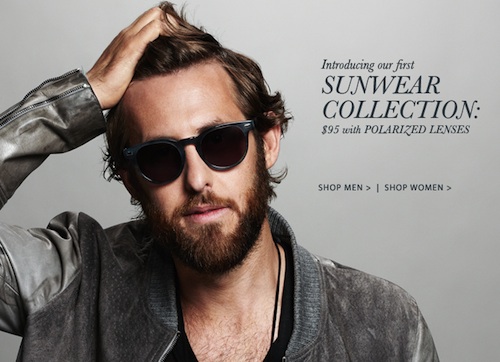A big discussion in retail the past three to five years has been “brick and mortar” vs. “online,” as if those ideas were two completely disparate worlds that could never possibly interact. That’s how places like Wal-Mart and Best Buy initially seemed to approach it, but now even the big-store, big-box companies are doing a lot more with app and online integration, especially for deal-hunting customers. But Warby Parker, which makes basically hipster eyeglasses and is now in bed with Beck, might be doing more than anyone to advance the idea of what “retail” really is. Consider:
Warby Parker began reversing the typical process of migrating a physical store into the cloud. It built real stores to complement and solidify its relationship with an adoring young-adult audience. The stores were digital-ready and intended to facilitate rather than separate the cyberspace world from the tangible one. Online appointments, a photo booth that e-mailed visitors their images and a tablet-based checkout were a few of the digital enhancements that made its stores feel as modern and engaged as its Web site and social media.
Fast Company just called them the world’s most innovative retail company, and Forbes highlighted 12 take-aways from their annual report (you can find the whole annual report here). It’s gotten to the point where Warby Parker is now a defining term for other start-ups, i.e. trying to become “the Warby Parker of bedding.”
They have a Google-type approach (“Do Good”) and has a social innovation aspect as well: for every pair of glasses they sell, they distribute a second pair to a person in need via a partnership with VisionSpring (a non-profit). And if you were wondering about the name, it’s a hipster delight:
The unique company name Warby Parker is based on two characters from author Jack Kerouac’s journals — Zagg Parker and Warby Pepper.
Here’s the thing: ultimately, this company was founded by four friends from Wharton, one of the best business schools in America (possibly the best on the east coast). It’s not like four starving dudes from Greenpoint launched it; these kids dropped a lot of tuition on Wharton and were setting themselves up (ideally) for pedigree. But the integration of “physical space” and online, the social innovation element, and the consistency of brand — Kerouac, Beck, etc. — are all excellent developments. They also seem to embrace a “culture of communication:”
On Wednesdays, the entire team comes together and we have updates from different departments. We view this as an opportunity for everybody in the company to understand what’s going on, because so much of what we do is integrated. It also provides learning opportunities, so somebody working in customer experience can learn about a brand-perception study. When you look at the reasons people leave companies, it’s usually because their boss is a jerk or because they aren’t learning and growing. So we spend a lot of time developing leaders internally and creating learning opportunities.
At these meetings, we also have new team members come up and introduce themselves and share a fun fact about themselves. It’s usually something humiliating, and the reason is to make that individual memorable to the rest of the team and also to make that individual vulnerable. It’s through vulnerability that human beings create connections. The more vulnerable we can be with one another, the more that we’ll trust one another and the more we’ll be able to collaborate effectively.
It kinda reminds me of another brand-centric, customer-driven place: Zappos, which has similar ideas about “open-ness.”
I’m not very hip and I don’t wear eyeglasses, so before I sat down to write this post, I had never even heard of Warby Parker. Now I think they’re a friggin’ awesome, innovative company. I’d love to see what happens next for ’em. They’ve already undercut and disrupted a pretty established industry, so if they can keep shifting with the times, they could be pretty big (they’re up to about 300 employees now, FYI).
